Demented in Damietta
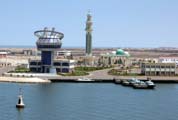 Damietta
is a new harbour just on the western side of the Suez delta sporting a mosque at
the approach, a large grain handling facility and a refinery that looked as if
every stainless tank and its maze of pipes had been freshly polished for our
arrival. The town was out of sight in the flat land somewhere, nothing sticking
up above the palm trees, so I imagined it to be fairly small. The whole
quite-considerable port area was contained within a security wall of metal
panels and outward-curving posts that no doubt supported barbed wire. Boxes at
intervals looked like guard post in the style of a prisoner of war camp.
Damietta
is a new harbour just on the western side of the Suez delta sporting a mosque at
the approach, a large grain handling facility and a refinery that looked as if
every stainless tank and its maze of pipes had been freshly polished for our
arrival. The town was out of sight in the flat land somewhere, nothing sticking
up above the palm trees, so I imagined it to be fairly small. The whole
quite-considerable port area was contained within a security wall of metal
panels and outward-curving posts that no doubt supported barbed wire. Boxes at
intervals looked like guard post in the style of a prisoner of war camp.
At breakfast the others decided
they were not going into the town. So I bustled about organising myself with
showering, donning fresh cloths, stashing money and bits and pieces in pockets,
ensuring I had the CD of photos to post and then it was down to B deck to catch
the Captain for permission to leave the boat at the earliest possible moment.
This is always after customs have checked the ships documents and a probable
sailing time has been set. As I left the Captain assured me that I wouldn't need
my passport and that there would be hubble-bubble pipes to smoke and belly
dancers to see. I did the usual signing off at the gangplank and then crossed to
where a small group of dock workers were assembled to ask them about a bus to
the gate and was told I could go in any car. I had noticed these dusty looking
squarish little cars and had wondered how the workers were allowed to bring
their family cars into the dock area. It turned out that they were official
cars, used for all the incidental transportation within the complex.
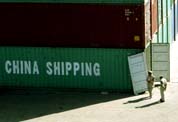 A
very friendly man offered to help me in every way he could and started by asking
if I had my passport. No, I didn't. He was most insistent. I must have a
passport and a ships pass before security would let me out the gate. Back up the
gangplank for the passport and down to try again. He asked to see them. Passport
yes. Ships pass no. My identity tag was not suitable. I explained as best I
could that this ID was all the ship issued but was firmly turned down. I trudged
back to the gangplank and was about to ascend when a voice called for me to
wait. It was my friend. Next thing I was confronted by a uniformed army officer
emphatically explaining that they needed a pass, a paper from the ship that they
could stamp. He returned to his hidey-hole container with the doors hanging off,
and I returned back up to the cargo office, now beginning to perspire somewhat,
to obtain the bit of paper. The Second Officer was more than perplexed because
as far as he was concerned no such thing existed and to make doubly sure he
searched through what forms they had. The First Officer was busy dealing with an
Egyptian shipping agent so I sat and waited. And waited. Eventually the agent
was consulted and I was proudly informed that passes were not available and that
they have very good security for the port and absolutely nobody could visit
Damietta.
A
very friendly man offered to help me in every way he could and started by asking
if I had my passport. No, I didn't. He was most insistent. I must have a
passport and a ships pass before security would let me out the gate. Back up the
gangplank for the passport and down to try again. He asked to see them. Passport
yes. Ships pass no. My identity tag was not suitable. I explained as best I
could that this ID was all the ship issued but was firmly turned down. I trudged
back to the gangplank and was about to ascend when a voice called for me to
wait. It was my friend. Next thing I was confronted by a uniformed army officer
emphatically explaining that they needed a pass, a paper from the ship that they
could stamp. He returned to his hidey-hole container with the doors hanging off,
and I returned back up to the cargo office, now beginning to perspire somewhat,
to obtain the bit of paper. The Second Officer was more than perplexed because
as far as he was concerned no such thing existed and to make doubly sure he
searched through what forms they had. The First Officer was busy dealing with an
Egyptian shipping agent so I sat and waited. And waited. Eventually the agent
was consulted and I was proudly informed that passes were not available and that
they have very good security for the port and absolutely nobody could visit
Damietta.
Well an agent is an agent I
reasoned so at least he might be so good as to post the CD for me. I put it to
him. Yes, he could do that. Great thought I. He made two phone calls to find out
the cost of postage so that I could give him the necessary US dollars for stamps
and during the conversation he was confirming with me that yes, one CD only,
airmail, to New Zealand. With a big toothy smile he turned to me and said,
"Thirty dollars". What!? Please check again that it is only one CD, airmail, to
New Zealand. Yes, that is right, "Thirty-five dollars" - this was obviously an
inflationary enquiry. I thanked him politely and declined. I returned to my
cabin, changed my cloths and had a good laugh. I had noticed, by the way, that
every Egyptian official leaving the ship during the morning had a carton of
cigarettes tucked under his arm so perhaps I hadn't gone about obtaining shore
leave in the correct way.
After chatting at lunch about my
shore visit the Captain decided to reveal something that he had been previously
reticent about sharing but had now obviously figured that I was not one to be
easily offended. He said that when customs were aboard in Freemantle and had
seen me so that they could check my appearance against my passport photo, they
later commented to the Captain on the excellent English I spoke. They had
assumed that all the passengers were German.
That evening out on E deck we
enjoyed an industrial sunset with the noise of trucks, loaders and gantry cranes
banging containers about with the sun going down behind a latticework of crane
legs. I proposed a good-natured toast to the Arabs. Another episode of Twin
Peaks vindicated the day.
Damietta to Malta was so calm that without looking out the porthole it was hard
to be certain that we were actually moving. Such conditions
emphasise
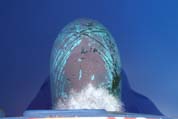 the
wonderful efficiency of the ships hull. Looking down on the bow bulb there is
little evidence of its huge twenty-knot thrust through the blue water except for
a continuous fine spray given by the stem cleaving the surface. The bow wave
wouldn't endanger a coracle. Water hisses smoothly back along the sides without
setting up a displacement wave at all. Most of the fuss is at the back end where
an enormous amount of displaced water churned by the propeller slides out from
beneath the stern's broad cusp. You can imagine a long-board surfer doing quite
well on the kindly, though foamy forward slope of the standing wave that rolls
along behind but his options for lateral travel wouldn't be great. The wave
simply runs out at either side and when he tired and slipped back a wave, it
would be hardly big enough or steep enough to catch. In moments he would be left
sitting on his board far astern and hardly bobbing on a surface that was quietly
returning its former calm state.
the
wonderful efficiency of the ships hull. Looking down on the bow bulb there is
little evidence of its huge twenty-knot thrust through the blue water except for
a continuous fine spray given by the stem cleaving the surface. The bow wave
wouldn't endanger a coracle. Water hisses smoothly back along the sides without
setting up a displacement wave at all. Most of the fuss is at the back end where
an enormous amount of displaced water churned by the propeller slides out from
beneath the stern's broad cusp. You can imagine a long-board surfer doing quite
well on the kindly, though foamy forward slope of the standing wave that rolls
along behind but his options for lateral travel wouldn't be great. The wave
simply runs out at either side and when he tired and slipped back a wave, it
would be hardly big enough or steep enough to catch. In moments he would be left
sitting on his board far astern and hardly bobbing on a surface that was quietly
returning its former calm state.
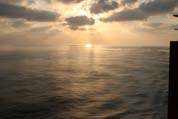 The
next night the setting sun treated us to one of the highlights (literally
speaking) of the entire trip. The Green Flash! It was a stunner and our loud
involuntary cheer had the captain pop out all grins to say how pleased he was
that it had happened for us because he reckoned most people he explained the
phenomenon to were totally sceptical.
The
next night the setting sun treated us to one of the highlights (literally
speaking) of the entire trip. The Green Flash! It was a stunner and our loud
involuntary cheer had the captain pop out all grins to say how pleased he was
that it had happened for us because he reckoned most people he explained the
phenomenon to were totally sceptical.
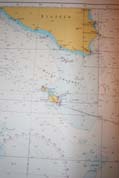 Malta
was the only place for which I had done any formal reading preparation and that
was through a chance purchase from that excellent second-hand book shop in
Jervois Road only days before my departure of a book called "The Great Siege of
Malta" by Ernle Bradford, on old hard-back with a Little Sisters of the Poor
ownership stamp rendering illegible a signature that could possibly be that of
the author. Printed in 1961, it looked dull, but turned out to be an excellent
account of the siege of the Order of the Nights of St John by the forces of the
Sultan of the Ottoman Empire in 1565. I was fired up for a day ashore where I
was quite sure I would at least recognise the significance of the physical
features even if I couldn't recall exact facts and figures. Apparently there are
also traces of monolithic construction dating from thousands of years ago. We
were to dock in the very bay that the invading forces had landed.
Malta
was the only place for which I had done any formal reading preparation and that
was through a chance purchase from that excellent second-hand book shop in
Jervois Road only days before my departure of a book called "The Great Siege of
Malta" by Ernle Bradford, on old hard-back with a Little Sisters of the Poor
ownership stamp rendering illegible a signature that could possibly be that of
the author. Printed in 1961, it looked dull, but turned out to be an excellent
account of the siege of the Order of the Nights of St John by the forces of the
Sultan of the Ottoman Empire in 1565. I was fired up for a day ashore where I
was quite sure I would at least recognise the significance of the physical
features even if I couldn't recall exact facts and figures. Apparently there are
also traces of monolithic construction dating from thousands of years ago. We
were to dock in the very bay that the invading forces had landed.
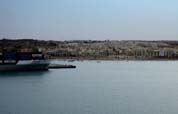
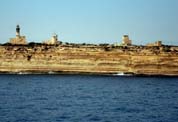
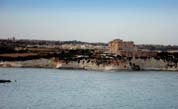
Within spitting distance of
Malta we had another power cut-out and glided almost to a stop before the main
engine restarted. I was so excited as we came into the Marasirocco Harbour (as
it is named in the book I read, but may not be its present name). This was my
first glimpse of an ancient land featuring remains of human activity that
stretched back into antiquity, a marvellous sensation and realisation for a
being from infant New Zealand. There were old fortifications along the cliffs, a
lighthouse and what I fancy are man made caves exposed in the cliff sides. I
clicked away madly with the camera just in case conditions changed by morning.
Well they changed alright - by the time there was enough light for photography
next morning, we were well back at sea.
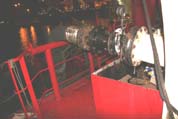
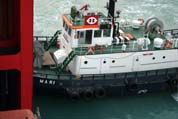 Guess
what? There was a quick turnaround that allowed us exactly one hour ashore.
Bunkering seemed to be the main purpose of the stop and if my memory serves, the
ship took on something like two-hundred tons of diesel. Fortunately it was not
as fumy as the previous time we bunkered. The photo of the tug boat was because
of its name and I wondered if it was pronounced "Maree".
Guess
what? There was a quick turnaround that allowed us exactly one hour ashore.
Bunkering seemed to be the main purpose of the stop and if my memory serves, the
ship took on something like two-hundred tons of diesel. Fortunately it was not
as fumy as the previous time we bunkered. The photo of the tug boat was because
of its name and I wondered if it was pronounced "Maree".
There was a small fish farm in
the middle of the harbour. Right on dusk we walked to the security gate to be
cheerfully waved through and wished a pleasant visit. What a contrast to the
previous port. We followed a rather battered access road around to the town
where there was a square open to the bay, passing on the way a rumpty-tumpty
yacht club where on a netting-enclosed verandah a caller conducted a group of
people line dancing to a fairly tranquil Elvis rock and roll number. The main
impression of the streets and buildings was one of dusty dilapidation although I
imagine that we were at the rougher end of town. What a shame I couldn't have
photographed it in daylight. I was particularly taken with the incongruity of
English signs on old buildings advertising scruffy first-floor business
premises. I should have written them down because they were classics in the
style of "Joe's Pies", not Maltese sign anywhere. Many of the doorways were
secured with some sort of ugly solid looking metal doors like Rolla-doors but
without the ribbing.
The whole island seemed to slope
gently into the sea illustrated by the regular slant of the sedimentary strata
of the cliffs which you can see in the photos. If you were to swim ashore at the
town you would crawl out of the water up the smooth sandstone which appeared to
be clean of weed or crustaceans, climb a small stone embankment and scramble
over the iron railing to find yourself on a wide stone-paved promenade with an
occasional couple wandering along or sitting on benches and a group of young men
quietly chatting and smoking. I imagine you would have to walk right up through
the town before finding a blade of grass. I discovered the Malta exchange rate
was 5 euro = 3 beers which Hermann assured me was reasonable, not that I
particularly minded one way or the other. We sat outdoors under cover where I
tried fairly successfully to ignore a huge high-resolution screen showing a
soccer game by gazing about at the nearby buildings and people watching. Men
grouped at a couple of the tables looked as if they were crew off other
freighters. Elvis is alive and living in Malta because there he was again
singing in the bar. I would have rather spent my time walking further around the
bay and town but all in all enjoyed the experience. The line dancers were still
stepping in unison as we returned to the wharf. At daybreak there were ten small
fishing boats dotted about on the calm sea and checking the chart I decided that
they must have been Sicilians working their home waters although the land was
out of sight. The strait between the toe of Sicily and Tunisia is relatively
shallow with banks that probably determine the fishing grounds.
Contact us at
cole@familycole.net Return to Home Page
 Damietta
is a new harbour just on the western side of the Suez delta sporting a mosque at
the approach, a large grain handling facility and a refinery that looked as if
every stainless tank and its maze of pipes had been freshly polished for our
arrival. The town was out of sight in the flat land somewhere, nothing sticking
up above the palm trees, so I imagined it to be fairly small. The whole
quite-considerable port area was contained within a security wall of metal
panels and outward-curving posts that no doubt supported barbed wire. Boxes at
intervals looked like guard post in the style of a prisoner of war camp.
Damietta
is a new harbour just on the western side of the Suez delta sporting a mosque at
the approach, a large grain handling facility and a refinery that looked as if
every stainless tank and its maze of pipes had been freshly polished for our
arrival. The town was out of sight in the flat land somewhere, nothing sticking
up above the palm trees, so I imagined it to be fairly small. The whole
quite-considerable port area was contained within a security wall of metal
panels and outward-curving posts that no doubt supported barbed wire. Boxes at
intervals looked like guard post in the style of a prisoner of war camp.








